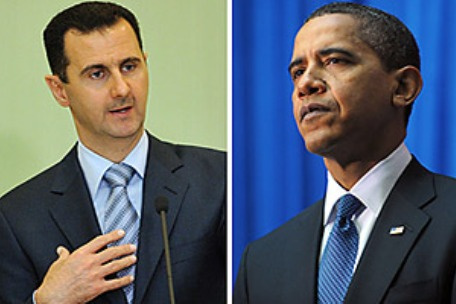Challenges and Turns in the US' Policy towards Syria

Middle East developments and the face-off between tyrant regimes and citizens in several Arab countries have deep implications, not only domestically, but also for the Middle East. The United States, as one of the key political actors in the region, has followed different, or better said, contradictory approaches towards these countries.
Syria best explains Washington's policy towards the Arab Spring. It is indeed the most complicated case for all Middle East actors, including the US. In the beginning of his presidency, US President Barack Obama followed a reconciliatory line towards Damascus, manifested in returning his envoy back to Syria and upgrading diplomatic ties. Two thoughts may have floated in Obama's head: that he could gradually drive Syria apart from Iran, and that he could engage it in peace talks with Israel. Obama had invested hope in Bashar Assad, his general political attitude, and his latent reformist tendency to attract the country towards the Western camp. Syrians however, cunning politicians that they are, used the opportunity to reconstruct their ties with Washington without moving away from Iran at the strategic level.
The pro-democracy uprising by Syrians inspired by the victories of their Arab brethren in Tunisia and Egypt compelled the Americans to rethink their policy. Damascus was at any rate tolerated before the uprising, since it was assumed that its instability would affect Tel Aviv. Syria's neighborhood, which counts Iraq and Turkey, also made it a shaky issue. In the meantime, the US came to the conclusion that with regard to its domestic circumstances and the arrangement of opinions in the UN Security Council, a Libyan approach could not be the model for Syria. The major objective, however, remained separating Damascus from Tehran. Also, Obama gradually came to believe that Bashar Assad may have limited chances in controlling the internal conflict.
The US Turn
At the height of criticizing Tunisia and Egypt, the US remained conspicuously silent about the developments in Syria. As the conflict spiraled in Daraa and other Syrian cities, however, the time came for Washington's policy turn. Second thoughts about Bashar Assad's capability to control the problem, the implications of the new situation for the West and the role of regional actors such as Qatar and Saudi Arabia facilitated this policy shift.
Domestic concerns inside the corridors of power in Washington also played a role. Hillary Clinton, said to be an aspiring candidate in the 2016 presidential election, gradually turned into the loudest voice for the US' policy towards Middle East developments. Her remarks, her behavior in her capacity as Secretary of State all bespeak hidden intentions and ambitions. Clinton is trying hard to portray herself as a true democracy advocate and a leader able to advance transformations and rebuild America's image across the globe.
The spread of protests from the margin to the center, from the cities of Hama, Homs and Daraa to Damascus, also influence the US' mentality about the nature of protests in Syria. Washington's ambassador to Damascus openly supported the protestors, against all diplomatic norms, and traveled to the city of Hama to voice support for the protestors. This, and pro-Assad attacks on the American and French embassies in Damascus, facilitated the US policy shift. Now the Americans talk of Bashar Assad losing legitimacy.
Washington has however hesitated in full engagement of anti-Assad measures and has outsourced its projects to regional allies. Israel, the US' closest ally, has remained silent, in fear of the strategic aftershock of the fall of the Assad regime. For them, security definitely overrides democracy. Meanwhile, they know that any supportive act for the protestors will upset the subtle balance in the favor of anti-Assad forces.
As usual, Saudi Arabia is the piggy bank for any project that has at its core harming Iran's regional interests. Syria can be the best target, considering the long-term strategic bond between Tehran and Damascus, which has determined the fate of many regional developments.
Qatar has assumed the media responsibility, via the Al Jazeera network and its provocative reports. However, the most critical role is consigned to Turkey. Ankara and Washington follow a coordinated policy towards Syria. On the one hand, Turkey hosts the Syrian opposition, and on the other, it coordinates regional and international efforts. Containing the crisis, forcing Assad to undertake substantial reforms, weakening the Syrian regime, and stopping the wave of refugees fleeing into Turkey and other neighbors, are the key goals.

